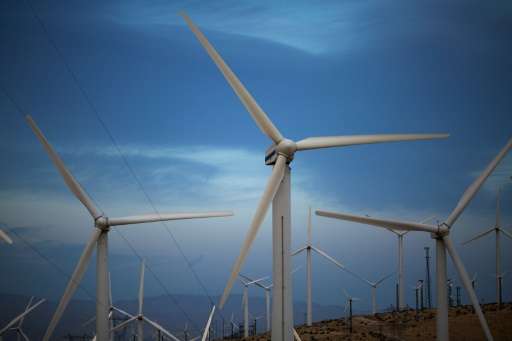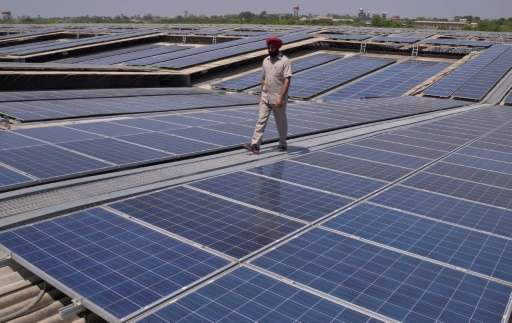Cheap gas, coal won't hobble renewables: energy report

Weak coal and gas prices will not stop record investment in renewables over the coming decades as the cost of generating clean energy drops, a key energy report said Monday.
Renewables are set to attract $7.8 trillion (6.9 trillion euros) by 2040, nearly four times as much as carbon-based power over the same period, the New Energy Outlook 2016 forecast said.
The impact of cheap gas and coal will be offset, it projected, by drops of 41 and 60 percent, respectively, in the price of power from wind and solar panels.
Compared to a year ago, the report projects "significantly lower" coal and gas prices, said Jon Moore, chief executive of Bloomberg New Energy Finance, the research unit which conducted the study.
"But, strikingly, (the report) still shows rapid transition towards clean power."
The shift, however, to a low-carbon energy sector will not happen quickly enough to keep global warming below two degrees Celsius (3.6 degrees Fahrenheit), much less the more ambitious goal embraced by the world's nations last December, the analysts warned.
The Paris Agreement calls for capping Earth's average surface temperature at "well below" 2.0C to stave off severe climate impacts.
To achieve even the two-degree target, additional investment of $5.3 trillion in zero-carbon power—on top of the projected $7.8 trillion—would be needed by 2040, the report concludes.
The energy sector accounts for two-thirds of the greenhouse gas emissions that drive global warming.
Currently, 80 percent of global energy consumption is drawn from fossil fuels.

From a climate change perspective, the annual report is a "good news/bad news" compendium of energy trends.
India holds the key
The encouraging surge in renewables—which today account for only a small slice of energy consumed—is balanced by the fact that fossil fuel power will still pull in more than $2.1 trillion (1.9 trillion euros) in investments by 2040, mainly in emerging economies.
China's slowing economy and retreat from coal means that CO2 emissions from the world's top carbon polluter may peak as early as 2025, five years earlier than Beijing promised.
At the same time, however, energy demands in India—which, despite a big push towards solar, continues to rely heavily on dirty coal—are forecast to nearly quadruple in the next quarter century.
"That makes India the key to the future global emissions trend," the authors said in a statement.
In Europe, renewables will dominate, generating 70 percent of the continent's power by 2040, up from 32 percent in 2015.
In the US, the share of wind, solar, hydro and other zero-carbon energy sources will jump from 14 percent last year to 44 percent in 2040.
At the same time, natural gas' slice of the energy pie will slip from 33 to 31 percent, despite a boom in fracking.
A surge in electric cars will add some eight percent to global electricity demand, the report forecast.
By 2040, 35 percent of light-duty vehicles sold in the world will be electric, some 41 million cars in all.
© 2016 AFP




















